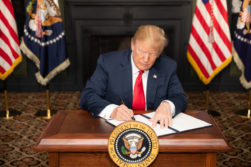
Renewed US sanctions on Iran making an impact. President Donald J. Trump signs an Executive Order on Iran Sanctions. Illustrative. (Official White House Photo by Shealah Craighead)
The United States’ plan to use economic sanctions to pressure the Iranian regime to change their ways is already bearing fruit—including a change in the regime. Economic Minister Massoud Karbasian was forced out of his position by a vote of no confidence by the Iranian parliament on Sunday, and the economic impact of the US sanctions played a role in that decision according to the Fars News Agency.
What’s more, two major airlines—British Airways and Air France, ended their activity in Iran last week, joining a prior decision by KLM. Israeli Prime Minister Benjamin Netanyahu, in comments released by his office during a visit to Lithuania last Thursday, said in response to the airlines’ decision, “That’s good. More should follow, more will follow, because Iran should not be rewarded for its aggression in the region, for its attempts to spread terrorism far and wide in the Middle East, into Europe… and to many other places in the world.”
The New York Times reported that while British Airways and Air France—who will end their flights to Tehran in September—did not cite US sanctions as the reason for canceling the routes, the report said analysts in the travel industry believe it was a factor. Meanwhile, the Iranian Fars report specifically mentioned the renewed US sanctions and their economic impact as one reason why the Economic Minister was impeached.
The vote was relatively close—137 votes of no confidence to 121 supporting the minister with two abstentions. Nonetheless, Fars noted that the economic leader is the second member of President Hassan Rouhani’s cabinet to be pushed out in the span of a month for economic reasons. Minister of Cooperatives, Labor and Social Welfare Ali Rabiei was previously removed from office over unemployment concerns.
Not everything is going badly for Iran these days, however. The European Union announced last Thursday that they would provide Iran 18 million euros to address “sustainable economic and social development,” according to a press release from the European Commission’s website.
While that includes 8 million euros of aid intended for Iran’s private sector, Netanyahu does not believe that the financial assistance will ultimately benefit the Iranian people as planned. In comments released by his office last Friday, he called it “a big mistake.”
“It’s like a poison pill to the Iranian people and to the efforts to curb Iranian aggression in the region and terror beyond the region,” said Netanyahu. “…Where will the extra money go? It’s not going to go to solve the water problem in Iran. It’s not going to go for Iranian truck drivers. It’s going to go to the missiles and to the revolutionary guards in Iran, in Syria and elsewhere in the Middle East. I think this should be changed.”
As an example of Iran’s nefarious activity, Netanyahu noted that recently Iran actually was planning a terror attack in Europe, “while Iran’s Foreign Minister was meeting with European leaders. That is incredible.”
Said Netanyahu, “All countries should join the efforts to restore sanctions on Iran in order to press them to stop their aggression and desist on their terrorist activities.”
(By Joshua Spurlock, www.themideastupdate.com, August 26, 2018)
